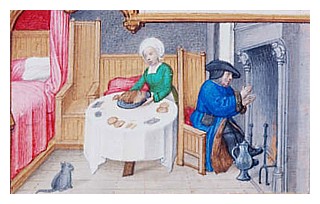|

Housework
STAFF - CLEANING -
LAUNDRY

Staff
Scenes of domesticity usually feature women involved with textile
arts or engaged in childcare. Working with a drop spindle or weaving
or bathing a newborn babe are common themes. Images of women performing
daily household chores other than these can be seen in some manuscripts
but are often considered not worthy of .
In many homes it was not unusual to have some kind of domestic
help. Even townspeople might have domestic staff. It was not just
the domain of the wealthy. Household rolls show a wide variety
of specialised roles which a woman might take, many for the running
of a house itself and not exclusively as labourer.
Seen above is a 15th
century manuscript detail which shows a woman performing the mundane
task of setting the table and serving the food. She might be a
wife, but could also easily be the live-in household help. Many
court records indicate that it was not unusual for a man to have
live-in help if he was unwedded, and taking advantage of these
women is a recurring theme in court records of unwanted physical
contact and pregnancy.

Cleaning
Rural woman did their own cleaning, although many peasant women
had domestic help. It isn't true that all peasants were extremely
poor, and a young, unmarried woman could earn extra money working
in another home. In her own house, she had dishes from cooking
and eating to tend to, laundry of clothes and bedsheets, bedbugs
and household pests to deal with and floors to sweep.
A townswoman or merchant woman would almost certainly have had
domestic help, and passed the smaller jobs of cleaning to another
woman. Many of these were single women who had come to the town
from the country and were employed on a live-in basis. This also
gave a young woman the skills she needed to learn in household
management before marrying and setting up house of her own.
It goes without
saying that the cleaning in a noble woman's house was also not
done by a noble woman herself. Many household accounts have listings
for their laundry expenses with prices and to whom they are paid.

Laundry
Rural women... Washing clothes may have been done either inside
over a fire or at a nearby stream and was often a social occasion
as well as a necessary chore. Laundry seems to be an exclusively
female activity.
In a town household or the house of an upper class woman, laundry
was carried out by female servants who were usually under the
charge of a senior laundress who was herself under the charge
of the noblewoman. Noble women were expected to oversee these
things but not take part in them herself.
More information on laundry techniques specifically for clothes,
can be found on clothing
care.

Copyright
© Rosalie Gilbert
All text & photographs within this site are the property of
Rosalie Gilbert unless stated.
Art & artifact images remain the property of the owner.
Images and text may not be copied and used without permission.
|